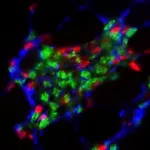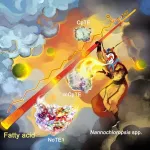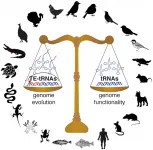(Press-News.org) UNIVERSITY PARK, Pa. -- Eating red meat may have a bad reputation for being bad for the heart, but new research found that lean beef may have a place in healthy diets, after all.
In a randomized controlled study, researchers found that a Mediterranean diet combined with small portions of lean beef helped lower risk factors for developing heart disease, such as LDL cholesterol.
Jennifer Fleming, assistant teaching professor of nutrition at Penn State, said the study suggests that healthy diets can include a wide variety of foods, such as red meat, and still be heart friendly.
"When you create a healthy diet built on fruits, vegetables, and other plant-based foods, it leaves room for moderate amounts of other foods like lean beef," Fleming said. "There are still important nutrients in beef that you can benefit from by eating lean cuts like the loin or round, or 93% lean ground beef."
David J. Baer, research leader at the United States Department of Agriculture - Agricultural Research Service, and study co-principal investigator, added, "This study highlights the importance of including lean beef in a Mediterranean dietary pattern that can yield heart-healthy benefits."
According to the researchers, red meat such as beef has been associated with an increased risk for cardiovascular disease in previous studies. But it has remained unclear whether red meat actually causes these effects or if they actually are caused by other diet and lifestyle choices that people engage in alongside red meat consumption.
Additionally, the researchers said many studies have combined both fresh and processed meats together when evaluating red meat consumption and health. Processed red meats have a very different nutrient profile than fresh meat -- for example, processed meat products are much higher in sodium -- that could explain the red meat research that has been reported.
"The Mediterranean diet is traditionally low in red meat," Fleming said. "But, knowing that many Americans enjoy red meat, we wanted to examine how combining lean beef with the Mediterranean diet would affect cardiovascular risk markers."
The study included 59 participants. Every participant consumed each diet for four weeks each, with a one week break between each diet period, and blood samples were drawn at the beginning of the study as well as after each diet period.
Three of the four diet periods contained different amounts of beef to a Mediterranean diet plan, which provided 41% calories from fat, 42% from carbohydrates and 17% from protein. In addition to the control average American diet, one diet provided 0.5 ounces of beef a day, which is the amount recommended in the Mediterranean diet pyramid. A second diet provided 2.5 ounces a day, which represents the amount an average American eats in a day, and the third experimental diet included 5.5 ounces a day, which previous research connected with certain heart health benefits.
All three Mediterranean diet periods included olive oil as the predominant fat source, three to six servings of fruits, and six or more servings of vegetables a day. The beef included in these diet periods was either lean or extra-lean.
Fleming said they were able to use a special technology called nuclear magnetic resonance -- or NMR technology -- to measure the number and size of lipoprotein particles. She said this study was one of the first randomized controlled trials of the Mediterranean diet to use the technique.
"This is important because there is growing evidence to suggest that LDL particle number is more strongly associated with cardiovascular disease risk than total blood LDL concentrations alone," Fleming said. "Moreover, we were able to identify changes in apolipoproteins, specifically apoB, which are also associated with increased CVD risk."
After the data were analyzed, the researchers found that participants all had lower LDL cholesterol following the Mediterranean diet periods compared to the average American diet. But while the total numbers of LDL particles were reduced following all three Mediterranean diet periods, they were only significantly decreased when following those periods that included 0.5 or 2.5 ounces of beef a day compared to the average American diet.
Additionally, non-HDL cholesterol and apoB -- a protein involved in lipid metabolism and a marker of CVD risk -- were lower following all three Mediterranean diet periods compared to the average American diet.
Fleming said the study -- recently published in the American Journal of Clinical Nutrition -- underscores the importance of consuming healthy, well-balanced diets.
"Our study helped illustrate the benefits associated with a healthy Mediterranean dietary pattern that embodies balance, variety and the inclusion of nutrient-rich components, which can include low to moderate amounts of lean beef," Fleming said.
INFORMATION:
Penny Kris-Etherton, Evan Pugh University Professor of Nutritional Sciences, Kristina Petersen, Assistant Professor of Nutritional Sciences at Texas Tech University, and David Baer, research leader at the U.S. Department of Agriculture Agricultural Research Service also participated in this work.
The Beef Checkoff, U.S. Department of Agriculture, Agricultural Research Service, Penn State Clinical and Translational Research Institute, and National Institutes of Health/National Center for Advancing Translational Sciences helped support this research.
Irvine, CA - April 14, 2021 - A new study, led by the University of California, Irvine (UCI), reveals how chronic inflammation promotes muscle fibrosis, which could inform the development of new therapies for patients suffering from Duchenne muscular dystrophy (DMD), a fatal muscle disease.
Titled, "A Stromal Progenitor and ILC2 Niche Promotes Muscle Eosinophilia and Fibrosis-Associated Gene Expression," the study was published today in Cell Reports.
Chronic inflammation is a major pathological process contributing to the progression and severity of several degenerative disorders, including Duchenne muscular dystrophy (DMD). Studies directed at establishing a causal link between muscular ...
What are scientists passionate about? What do they actually do, and why does it matter? Answering questions like these is often part of public outreach efforts that, through demystifying the world of science for non-scientists, can increase appreciation for science and boost support for important research initiatives. Outreach can also make the sciences attractive and accessible to a broader diversity of people, who, in turn, can bring new ideas and perspectives.
"Science is having challenges in terms of getting the general public to support it and ...
BOSTON - The anti-diabetic drug phenformin may prompt stronger cancer-fighting activities than its sister compound metformin, a finding that could have major implications for current and future clinical trials investigating both agents for their anti-cancer potential, according to researchers at Massachusetts General Hospital (MGH). In a review article in Trends in Cancer, the team presented evidence that immunotherapies such as immune checkpoint inhibitors (which enable T cells to attack and kill cancer cells) in combination with phenformin may also be a promising way to repurpose this diabetic drug as an anti-cancer ...
One consequence of the coronavirus pandemic has been global restrictions on mobility. This, in turn, has had an effect on pollution levels in the atmosphere. Researchers from across the world are using this unique opportunity to take measurements, collect data, and publish studies. An international team led by Forschungszentrum Jülich's Institute of Climate and Energy Research - Troposphere has now published a comprehensive review providing an overview of results up to September 2020. The study also has its own dedicated website, where additional measurement data can be added to supplement and refine existing research results. At the same time, this collection of data allows scientifically substantiated predictions to be made about the ...
By combining the 'chassis' of an oil-producing microalgae with genes from a Cuphea plant, scientists from the Single-Cell Center, Qingdao Institute of BioEnergy and Bioprocess Technology (QIBEBT) of the Chinese Academy of Sciences (CAS), can turn the algae into a microbial cell factory that can produce various oils with different properties.
The study was published in Metabolic Engineering on April 3.
Oils are composed of fatty acids, and fatty acids are composed in part of chains of carbon atoms. The length of these carbon chains can impact the physical properties of the fatty acid and thus the ...
While people may expect suicide rates to rise during a worldwide crisis such as the COVID-19 pandemic, a University of Michigan study suggests the onset of the pandemic and state of emergency executive orders likely did not increase suicide-related behavior in the early months of the outbreak.
The report, led by U-M researchers Rachel Bergmans and Peter Larson, found that emergency room visits related to suicide attempt and self-harm decreased by 40% during the first eight months of Michigan's lockdown. Their results are published in the Journal of Epidemiology and Community Health.
The study compared emergency room reports of suicide attempt and intentional self-harm at a hospital in Michigan's Washtenaw County during the first 8 months of the ...
The COVID-19 pandemic has cast a harsh light on the urgent need for quick and easy techniques to sanitize and disinfect everyday high-touch objects such as doorknobs, pens, pencils, and personal protective gear worn to keep infections from spreading. Now scientists at the U.S. Department of Energy's (DOE) Princeton Plasma Physics Laboratory and the New Jersey Institute of Technology (NJIT) have demonstrated the first flexible, hand-held, device based on low-temperature plasma -- a gas that consists of atoms, molecules, and free-floating electrons ...
Birds have been shaped by evolution in many ways that have made them distinct from their vertebrate cousins. Over millions of years of evolution, our feathered friends have taken to the skies, accompanied by unique changes to their skeleton, musculature, respiration, and even reproductive systems. Recent genomic analyses have identified another unique aspect of the avian lineage: streamlined genomes. Although bird genomes contain roughly the same number of protein-coding genes as other vertebrates, their genomes are smaller, containing less noncoding DNA. Scientists are still exploring the potential consequences of this genome reduction on bird biology. In a new ...
UPTON, NY--Scientists at the U.S. Department of Energy's (DOE) Brookhaven National Laboratory and the University of Illinois Urbana-Champaign (UIUC) have developed a new mathematical model for predicting how COVID-19 spreads. This model not only accounts for individuals' varying biological susceptibility to infection but also their levels of social activity, which naturally change over time. Using their model, the team showed that a temporary state of collective immunity--what they coined "transient collective immunity"--emerged during early, fast-paced stages of the epidemic. However, subsequent "waves," ...
An alloy is typically a metal that has a few per cent of at least one other element added. Some aluminium alloys have a seemingly strange property.
"We've known that aluminium alloys can become stronger by being stored at room temperature - that's not new information," says Adrian Lervik, a physicist at the Norwegian University of Science and Technology (NTNU).
The German metallurgist Alfred Wilm discovered this property way back in 1906. But why does it happen? So far the phenomenon has been poorly understood, but now Lervik and his colleagues from NTNU and SINTEF, the largest independent research institute in Scandinavia, have tackled that question.
Lervik recently completed his doctorate at NTNU's Department of Physics. His work explains an important part of this ...





